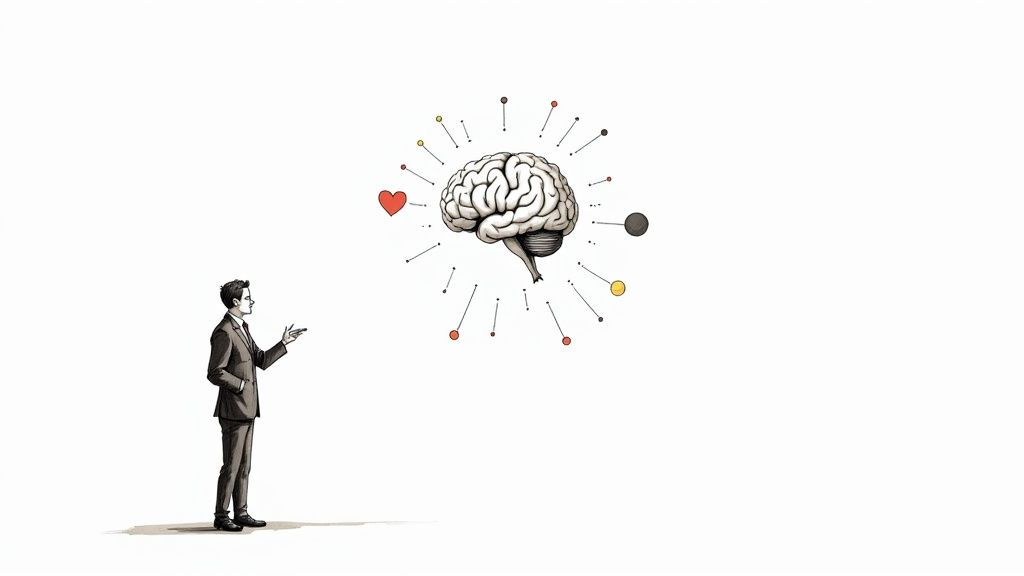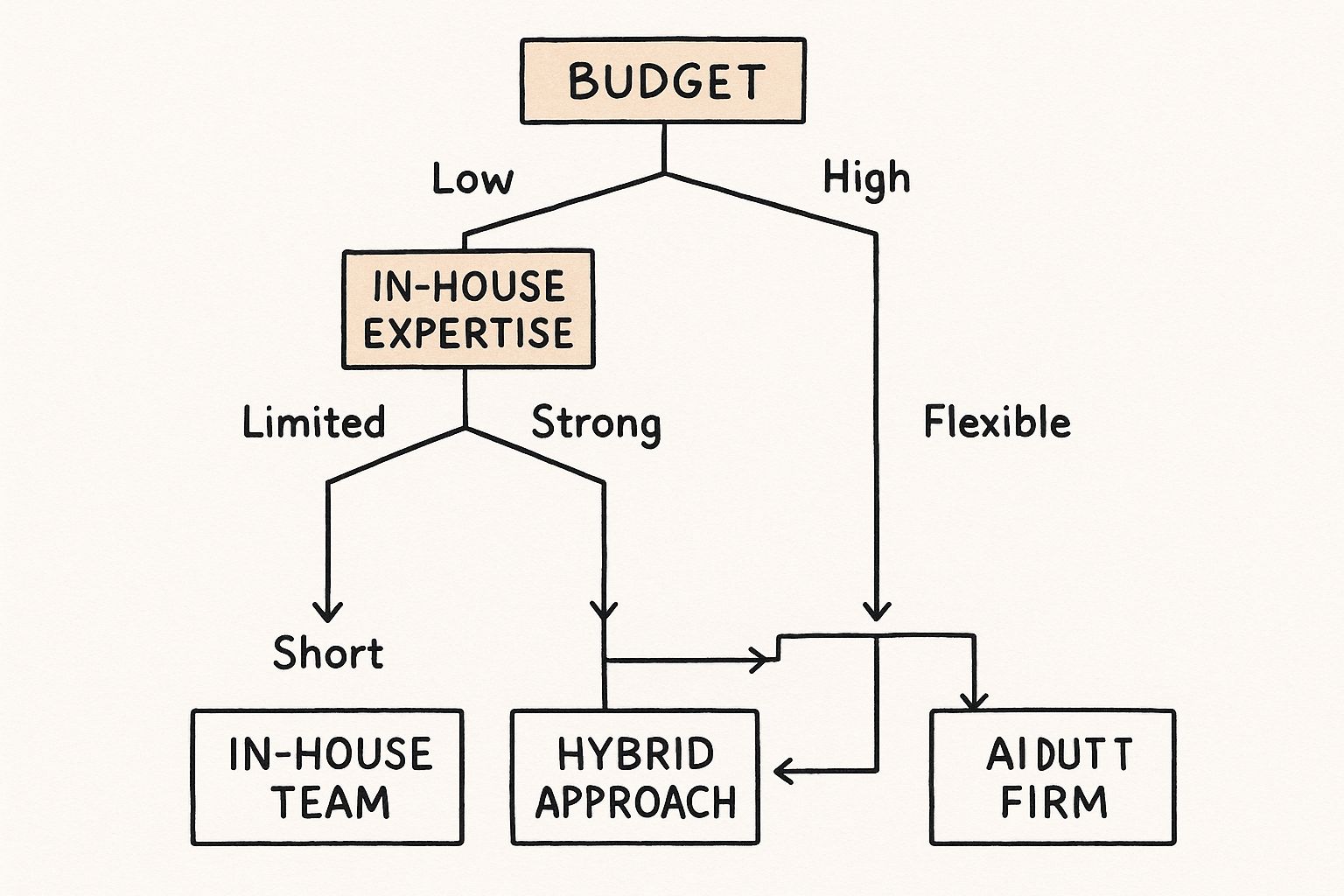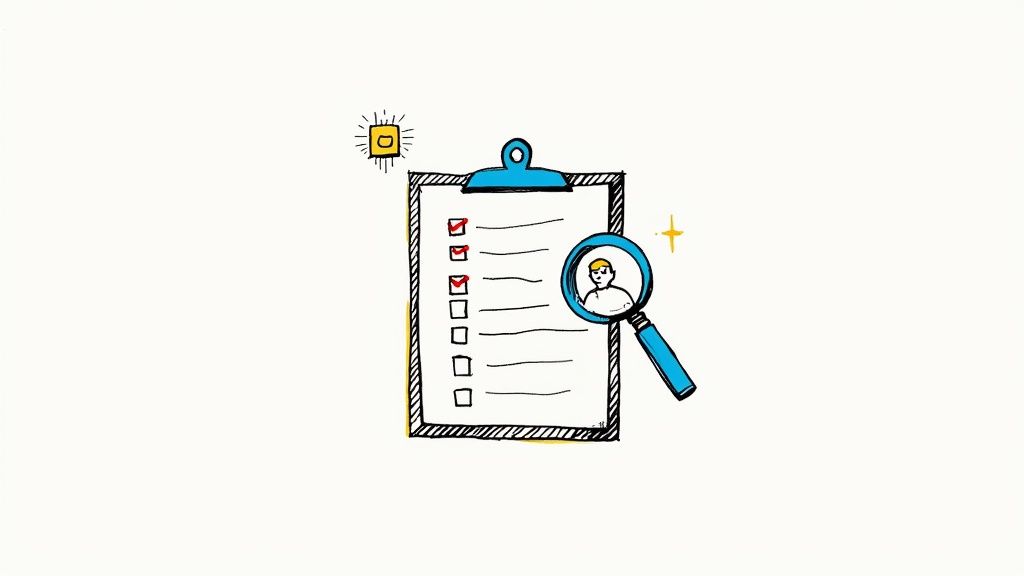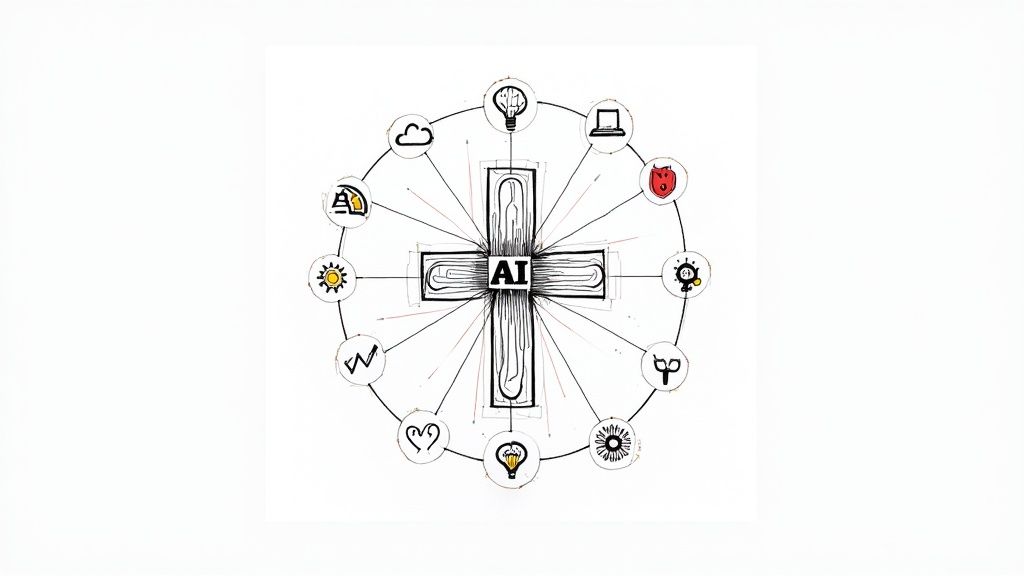Your Guide to an AI Consulting Firm
Discover how the right AI consulting firm transforms business operations. Learn how to choose a partner, implement AI strategy, and drive tangible results.

Think of it this way: you wouldn't try to build a Formula 1 car with a standard socket set you bought at the hardware store. You might end up with something that moves, but it's certainly not going to win any races. An AI consulting firm is like bringing in a specialized pit crew and engineering team—they have the advanced tools and, more importantly, the expertise to build an intelligent engine that gives your business a real competitive edge.
What Is an AI Consulting Firm?
At its heart, an AI consulting firm is a strategic partner. Their job is to bridge the often-massive gap between complex artificial intelligence technology and your actual business objectives. They don’t just sling code; they provide a clear roadmap, deep expertise, and the hands-on power to turn your raw data into a genuine strategic asset.
Their main goal is to help your organization pinpoint, plan, and then implement AI solutions that solve specific, nagging problems and create value you can actually measure.
This is far more than just outsourcing a tech project. It’s a deeply collaborative process, a true AI co creation, that makes sure every solution is perfectly matched to your unique operational hurdles and long-term vision. Without this kind of expert guidance, many companies end up sinking money into flashy tech that doesn't align with their core needs, which almost always leads to wasted resources and disappointment.
The Strategic Value Beyond Technology

The real magic of a great AI consulting firm is its ability to translate technical jargon and potential into tangible business performance. They force you to answer the tough, critical questions that separate success from failure, like which of your problems are even a good fit for AI and how you'll prove the investment was worth it.
These firms also bring a wealth of cross-industry knowledge to the table—they’ve seen what works, and perhaps more importantly, what doesn't. That experience helps you sidestep common pitfalls and dramatically shorten the time it takes to get from a good idea to a real-world impact.
The global AI consulting market was valued at USD 8.75 billion in 2024 and is projected to skyrocket to USD 58.19 billion by 2034, growing at an incredible CAGR of 20.86%. This explosion shows that businesses no longer see AI as a simple tech upgrade but as a critical strategic imperative. You can explore the full AI consulting market analysis to see the data for yourself.
This growth highlights a massive shift in how companies think. Businesses are actively hunting for expert guidance to navigate the complexities of AI, from initial readiness checks and identifying high-impact real-world use cases to building the solid governance frameworks needed to keep things on track.
Core Functions of a Modern AI Partner
So, what does an AI consulting firm actually do? A good one provides end-to-end support throughout your entire journey. Think of them as translators, strategists, and implementers all rolled into one, ensuring every step you take is deliberate and effective.
The table below breaks down the essential roles they play.
Core Functions of an AI Consulting Firm at a Glance
Function | Description | Business Impact |
|---|---|---|
Strategic Planning | They help you build a clear, actionable AI roadmap that directly supports your main business goals. This is where a solid AI strategy framework is absolutely essential for any kind of long-term success. | Ensures AI initiatives are not just "science projects" but are focused on driving real business outcomes and delivering a measurable return on investment. |
Use Case Identification | They work with you to pinpoint the specific areas of your operation where AI can make the biggest difference, from automating mind-numbing tasks to uncovering entirely new ways to generate revenue. | Focuses resources on the highest-value opportunities, preventing wasted effort on low-impact applications and accelerating the time-to-value for your AI investments. |
Data Readiness & Governance | They assess your current data infrastructure and help establish the necessary policies to ensure your data is high-quality, secure, and compliant before you even start building AI models. | Prevents the "garbage in, garbage out" problem by creating a solid data foundation, which is critical for building accurate, reliable, and trustworthy AI systems. |
Implementation & Integration | They handle the technical heavy lifting of building and deploying custom AI models, making sure they integrate smoothly with the software and systems you already use every day. | Delivers a functional, fully integrated solution that works within your existing workflows, minimizing disruption and maximizing adoption by your team. |
Ultimately, partnering with the right AI strategy consulting firm isn't just about buying a piece of technology. It's about building up your own internal capabilities and securing a sustainable advantage in your market. When you work with our expert team, you don't just get a solution—you get a partner dedicated to your long-term success.
What an AI Consulting Firm Actually Does
A great AI consulting firm does a lot more than just geek out on code. They’re your partner in weaving artificial intelligence into the very fabric of your business. Think of their services not as a checklist, but as a series of connected steps that guide you from a vague idea to a real, measurable impact. Each service builds on the last, turning the abstract promise of AI into a concrete advantage for your company.
The whole journey has to start with a solid plan. Without a clear strategy, even the most powerful AI is just an expensive science project. A good strategy makes sure every action has a purpose, every dollar is spent wisely, and the whole effort points directly toward your core business goals.
AI Strategy and Roadmap Development
Before a single line of code gets written, a top-tier AI consulting firm helps you lay the groundwork. This usually kicks off with a collaborative AI strategy consulting process to hammer out a clear, practical roadmap. It’s all about answering the big "why" before getting lost in the "how."
This means rolling up their sleeves for deep-dive workshops and talking to your key people to truly understand your biggest headaches and best opportunities. The result isn't a fluffy presentation; it's a detailed plan with specific goals, KPIs, and a step-by-step guide for getting things done. It’s the difference between fumbling around in the dark and navigating with a map and compass.
Data Readiness and Infrastructure Assessment
Data is the fuel for any AI engine. So, a fundamental service any good consultant provides is a thorough check-up of your data assets. It's like getting a structural survey done before you build a skyscraper—you have to be sure the foundation can handle the weight.
This process typically involves:
Data Auditing: Taking stock of your current data to see if it's clean, complete, and actually usable.
Infrastructure Review: Looking at your existing systems for data storage and processing to see if they’re up to the task.
Governance Planning: Setting up clear rules for how data is collected, managed, and used to keep everything compliant and ethical.
Skipping this step is one of the most common reasons AI projects fall flat. It’s how you avoid the classic "garbage in, garbage out" problem that dooms so many initiatives before they even start.
Use Case Identification and Prioritization
Here’s a hard truth: not every business problem is a good fit for AI. A huge part of a consultant's job is helping you find and prioritize the projects that will give you the most bang for your buck. This isn't just a brainstorming session; it's a tough, analytical process.
Consultants bring their experience from across different industries to spot processes that are ripe for automation or optimization. For instance, an AI Strategy consulting tool can model the potential payoff of different ideas, helping you zero in on the projects that promise the biggest wins. This helps you score some quick victories, which is perfect for building momentum and getting everyone on board for the bigger, more ambitious projects down the road.
A study by Forrester Consulting, commissioned by LexisNexis, really drives this point home. Their analysis showed that a typical large law firm using a specific AI tool could see a 344% projected ROI over three years. Even more impressively, they could recover up to $6.2 million in fees they had previously written off. This is a perfect example of what happens when you apply AI to the right problems.
Custom Model Development and Implementation
With a solid strategy in place and your data in order, it's time to get technical. This is where data scientists and machine learning engineers step in to build and train custom AI models designed just for you. We’re not talking about generic, off-the-shelf software here. This is about creating a solution that fits your unique business like a glove.
This service covers everything from choosing the right algorithms and training the models to putting them through rigorous testing. A key piece of this puzzle is a detailed AI requirements analysis, which can be made much simpler with modern tools. This ensures the final model isn't just a technical marvel but actually solves the business problem you started with. From there, the focus shifts to plugging the solution into your existing workflows, where hands-on AI implementation support is critical for a smooth rollout and getting your team to actually use it.
Why Your Business Needs an AI Strategy Partner

Bringing in an AI consulting firm isn't just about outsourcing a technical task. It’s about gaining a strategic partner who can guide you through the hype, help you sidestep costly mistakes, and genuinely accelerate your path to innovation.
Think of it this way: you could hire a freelance coder to build a specific tool, and they might do a great job. But a true strategy partner helps you build a lasting competitive advantage. The first gives you a fish; the second teaches you how to fish in the complex waters of AI.
Too many companies get caught up in the allure of flashy technology that, in the end, doesn't solve a core business problem. Others get a promising pilot project off the ground only to see it stall, never scaling to deliver real, company-wide value. A good partner prevents this by keeping the focus locked on business outcomes from the very beginning.
Beyond the Code: Managing Risk and Maximizing ROI
The real value of an AI consulting firm is their ability to handle all the complexities that live outside the code itself. AI projects are minefields of potential risks—from ethical quandaries and data governance nightmares to navigating a maze of compliance regulations. Trying to tackle this alone is a monumental challenge, even for businesses with strong in-house tech teams.
An experienced partner brings a battle-tested perspective to the table. They’ve already guided other organizations through these exact challenges. They provide the frameworks and best practices to ensure your AI solutions are not just powerful but also responsible, secure, and compliant. This proactive risk management is priceless, protecting your brand and preventing expensive missteps down the road.
This strategic oversight is what drives a much higher return on your investment. By making sure projects are clearly defined, properly governed, and tied directly to key business goals, a consulting partner helps you stop wasting resources and start focusing your efforts where they'll make the biggest difference.
The market for AI consulting is booming, which tells you just how much businesses need this kind of guidance. Valued at $11.07 billion in 2025, the market is projected to explode to an incredible $90.99 billion by 2035. That's a compound annual growth rate (CAGR) of 26.2%, fueled by companies using AI to gain a serious competitive edge.
This rapid growth isn't just a trend; it's a clear signal that companies recognize that succeeding with AI requires more than just internal tinkering. It demands a dedicated, experienced guide.
From Idea to Impact, Much Faster
One of the biggest, most immediate benefits of partnering with an AI expert is speed. An experienced firm doesn’t need to learn on your dime. They walk in the door with proven methods, ready-to-use components, and a deep understanding of how to get from a concept to a working solution without unnecessary delays.
This isn't just about faster coding; it's about getting to real-world impact much more quickly. A good partner helps you build momentum by delivering "quick wins"—smaller projects with high visibility that prove the value of AI early on. This success helps build support across the organization for even bigger initiatives.
Focused Execution: They know how to identify the 20% of effort that will deliver 80% of the results, cutting through the noise.
Proven Frameworks: They apply a structured AI strategy framework that has been tested and refined across countless projects and industries.
Building Your Capability: A great partner doesn’t just hand over a finished product and walk away. They work alongside your team, upskilling them in the process and leaving your organization more self-sufficient than they found it.
Ultimately, an AI strategy partner acts as a force multiplier for your own team. They bring the specialized knowledge, strategic foresight, and hands-on experience needed to turn the potential of AI into a real, sustainable advantage for your business.
How to Choose the Right AI Consulting Firm
Picking the right partner for your AI journey is one of the most important decisions you'll make. This isn't just about hiring a few tech gurus; it’s about finding a team that gets your vision, understands your industry's quirks, and can turn complex algorithms into real-world business value. A little due diligence here can be the difference between a game-changing partnership and a frustrating, expensive misstep.
So, how do you navigate this choice? You need a practical game plan. Look past the slick marketing and dig into what a firm can actually do, what they've done before, and how they work with clients. The real goal is to find an AI consulting firm that feels like an extension of your own team, one that focuses on genuine AI co creation rather than just checking boxes on a contract.
This decision tree is a great starting point, helping you map out a path based on your budget, internal know-how, and how fast you need to move.

As you can see, a dedicated AI consulting firm is often the best move when you have a decent budget but lack the specialized expertise in-house. It’s the path that gives you both the strategic brainpower and the hands-on skills needed to get the job done right.
Start By Defining Your Own Needs and Goals
Before you even think about calling a consultant, you need to look in the mirror. What problem are you actually trying to solve? Vague ambitions like "we want to use AI" are a direct route to disappointment and wasted money. You have to get specific.
Are you looking to:
Automate a mind-numbing manual process that’s eating up your team’s time?
Sift through customer data to figure out why people are leaving?
Sharpen your sales forecasts to avoid overstocking or running out of inventory?
Nailing down the business objective and how you'll measure success is the absolute first step. This clarity doesn't just help you find the right firm; it keeps the entire project grounded in delivering tangible results. This foundational work is what any good AI strategy consulting engagement is built on.
Evaluate Their Technical Chops and Industry Experience
Once your goals are crystal clear, it’s time to vet potential partners. Technical skill is a given, but it’s about more than just knowing Python or TensorFlow. You need a firm that understands the whole AI lifecycle—from wrangling messy data and building the model to deploying it and keeping it running smoothly.
The real differentiator, though, is industry experience. A firm that has already solved problems in your world will understand your unique challenges, data sources, and regulatory headaches. They’ll speak your language. This cuts the learning curve dramatically and leads to far more effective solutions. Don’t fall for generic claims; ask for specific real-world use cases that resonate with your business.
When you’re vetting a firm, ask the tough questions: "Walk me through a project where you solved a problem like ours. What were the data hurdles, how did you clear them, and what was the bottom-line business impact?" How they answer that question tells you everything you need to know about their real-world expertise.
Assess Their Culture and How They Partner With Clients
Technical skills get a firm in the door, but a successful project depends on cultural fit. Remember, you're not just buying a piece of software; you're building a relationship with people you'll be working with very closely. You want a firm that is transparent, communicates clearly, and embraces a collaborative, roll-up-your-sleeves approach.
The best partners don't just do what you ask. They push back, challenge your assumptions, and bring fresh ideas to the table. Their goal should be to empower your team for the long haul, not create a permanent dependency. The people are just as important as the technology. The right fit will feel like a natural part of your organization, all driving toward the same goal.
To make this process less subjective, it helps to use a structured evaluation framework. The table below lays out the key things to look for when you're comparing your options.
Key Criteria for Evaluating an AI Consulting Firm
A structured comparison is the best way to objectively assess potential AI partners. This framework helps you look beyond the sales pitch and focus on the factors that truly predict a successful outcome.
Evaluation Criterion | What to Look For | Why It Matters |
|---|---|---|
Industry Specialization | Proven experience and success stories in your specific sector (e.g., finance, healthcare, retail). Ask for case studies. | They'll already understand your market dynamics, regulations, and common pain points, which means faster, more relevant solutions. |
Full-Cycle Capability | Expertise that covers the whole journey: strategy, data prep, model development, implementation, and ongoing support. | A one-stop shop prevents knowledge gaps and friction. You won't have to manage multiple vendors or worry about messy handoffs. |
Partnership Culture | A transparent, collaborative style that focuses on co-creation, sharing knowledge, and open, honest communication. | A good cultural fit builds trust and ensures the firm is truly invested in your success, acting as a strategic partner, not just a hired gun. |
Ethical Framework | A clear, documented policy on responsible AI, covering data privacy, model fairness, and eliminating bias. | This shows they're committed to building trustworthy AI that won't expose you to massive reputational and legal risks down the line. |
In the end, choosing the right partner is a mix of evaluating their technical muscle, their relevant experience, and the human element of partnership. By taking a thoughtful, structured approach, you can confidently find a firm that will not only build a great solution but also empower your business for years to come. The tech is powerful, but it's the people behind it that make all the difference—a philosophy embodied by our expert team.
From Strategy to Reality: Real-World Success Stories

A well-crafted AI strategy is great, but the real measure of an AI consulting firm is its track record. Can they actually deliver? Theory and roadmaps are just the starting line; what matters is turning those plans into concrete business value. This is where success stories move beyond talk and show the real-world impact of a great AI partnership.
The best projects tell a clear story, starting with a messy business problem and ending with a smart, data-driven solution. As we explored in our AI adoption guide, this journey needs a deliberate approach that ties technology directly to business goals.
Let's look at how this plays out in a couple of different industries.
Case Study 1: The Global Insurer Drowning in Documents
A major global insurance provider, responsible for billions in commercial claims, had a huge bottleneck. Their claims agents were buried under a mountain of unstructured documents—police reports, medical records, expert assessments—all scattered across different SharePoint sites. Sifting through this data manually was agonizingly slow, full of errors, and put them at serious risk of missing regulatory deadlines.
The mission was clear: how could they automatically pull critical risk data from thousands of documents while making sure every insight was fully traceable? The answer came out of a deep-dive AI strategy consulting engagement.
The consulting team built a sophisticated AI pipeline. It used Optical Character Recognition (OCR) to turn scanned documents into text, then fed that text into Large Language Models (LLMs) trained to understand and extract the specific information needed. The system didn't just find the data; it provided source citations for every single point, ensuring complete regulatory compliance.
The results were incredible:
A 90% reduction in the time it took to analyze risk-related data from documents.
An 80-90% drop in manual review cycles, freeing up senior experts for more strategic tasks.
A 20-30% boost in decision confidence for the claims handlers.
This project is a perfect example of how a focused AI solution, born from a collaborative partnership, can untangle a deep-rooted operational knot and deliver a massive return on investment.
Case Study 2: Boosting Mining Operations with Predictive Power
A leading mining company was searching for an edge in its ore processing operations. Even a tiny efficiency gain at one of their major sites could mean millions of dollars in extra output. The problem was that the factors impacting copper recovery were incredibly complex and interconnected, making it almost impossible for human operators to optimize on the fly.
This is where an AI consulting firm with serious industrial experience came into the picture. They teamed up with the site's own engineers, starting with a discovery phase to pinpoint the most critical variables. Using historical production data, they trained a series of machine learning models that could predict how different operational settings would affect the final copper output.
The AI consulting market is exploding. Forecasts show a value of USD 16.4 billion in 2024 projected to hit a staggering USD 257.60 billion by 2033. This growth, at a compound annual growth rate (CAGR) of 35.8%, is fueled by companies in sectors like manufacturing and finance looking for experts to help them do exactly what this mining company did: turn complex data into actionable insights. You can get a closer look at the market's rapid expansion here.
These predictive models were integrated directly into the control room, giving operators real-time recommendations. The outcome? A 10% increase in copper ore processing at the site, which added up to thousands of extra metric tons every single day.
This win was built on genuine AI co creation, where the consultants' tech skills were fused with the hands-on knowledge of the company's own staff. It’s a classic example of how AI should work: enhancing human expertise, not replacing it. These are the kinds of tangible outcomes you can find when reviewing a firm's portfolio of real-world use cases.
Ultimately, these stories prove that when a clear strategy is brought to life by a skilled team, AI becomes a powerful engine for growth. The people behind the technology are what truly make the difference—a principle embodied by our expert team.
Your Questions About AI Consulting Answered
It’s completely normal to have a lot of questions when you first start exploring AI. Let's be honest, it can feel like a complex new world. This section is here to answer the most common things business leaders wonder about before they partner with an AI consulting firm. Our goal is to clear up the confusion so you can move forward feeling confident.
How Much Does AI Consulting Typically Cost?
This is the big question, and the honest answer is: it depends entirely on what you need. A small, focused strategy session that takes a few weeks is a very different beast from a multi-year project to build and integrate a complex AI system. There’s no one-size-fits-all price tag.
What you should look for is a firm with a transparent pricing model. They should be able to tie their fees directly to project milestones or offer a clear retainer for ongoing advice. Think of it less like a flat fee and more as a structured investment in achieving specific business goals.
How Long Does It Take to See Results From an AI Project?
While building a solid foundation, like a company-wide data strategy, does take time, you shouldn't have to wait years to see a payoff. Most good consulting firms will aim for "quick wins" to prove the value of the project early on.
For a focused initial project, like building a model to predict customer churn, it's realistic to see tangible results within the first 3 to 6 months. These early successes are fantastic for showing a clear return on investment, which helps get everyone on board for the bigger, more ambitious goals down the road. It’s always a balance between the complexity of the problem and the business need.
Progress in AI is almost always incremental. It starts with a solid plan that maps out both the immediate gains and the long-term vision. This phased approach is what makes the whole journey manageable and keeps it focused on results.
Who Owns the Intellectual Property Developed During an Engagement?
This is a crucial detail that absolutely must be spelled out in your contract before any work starts. Any reputable consulting firm will have a straightforward, client-first policy on intellectual property (IP).
The standard arrangement is that you, the client, own the final work product. That means the custom-built models, the unique code, and the specific strategies created just for your business belong to you. The consulting firm will usually retain the rights to their own pre-existing tools and general methods, but the solution they build for you is yours.
What if Our Team Has Limited Technical Expertise?
That’s one of the main reasons companies hire AI consultants in the first place! A huge part of a consultant's job is to bridge that exact knowledge gap. They need to be more than just tech experts; they have to be great communicators and teachers.
A good partner excels at explaining complex ideas to non-technical leaders and works alongside your team, not in a silo. Their real goal isn’t just to hand over a finished product and leave. It’s to empower your organization and build up your team's own skills over time.
For a deeper look at other common questions, feel free to explore our full AI consulting FAQ page. Ultimately, the best partnerships leave your team more capable and confident with AI than they were before. It’s an investment in your technology and your people. Learn more about the people who make it happen on our team page.



